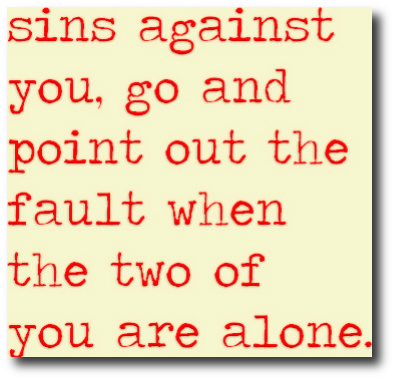How long has it been since you heard the Ten Commandments read out loud?[0] I don’t remember, it’s been quite a long time. In some old churches on the East coast, worshipers and tourists can still find the words written on the sanctuary walls, framing the lectern and the pulpit, the baptistery and the table. Early Anglican tradition in the colonies, long before the American Revolution began, required that the Ten Commandments were to be “set up on the East end of every Church and Chapel, where the people may best see and read the same.” In those days, the East end was the front of the sanctuary. Before the service began, you could sit in the pew, meditate on the writing on the wall and reflect on your week in light of the ten words.
Martin Luther was convinced that knowing the Ten Commandments was tantamount to knowing the entire Bible. “This much is certain,” he wrote in the introduction to the Large Catechism, “those who know the Ten Commandments perfectly know the entire Scriptures and in all affairs and circumstances are able to counsel, help, comfort, judge and make decisions in both spiritual and temporal matters.”[1] He knew, of course, that knowing the ten perfectly doesn’t end with being able to recite them – but it certainly begins there. There are ten of them, which is very good because we can use our fingers to help us learn and remember. They are, for the most part, brief and simple, so we can take them to heart and hold them in memory. They become part of us so they can guide us in our living. Knowing them perfectly is not just about unfolding every possible nuance of their meaning, but about living with them, every day; becoming familiar with them as with a path you walk every morning, and every morning it shows you something new. They are more than just rules and laws; they are good words that open us to the will and wisdom of God.
At the heart of the ten commandments is the good word about remembering the sabbath. Jesus taught that the sabbath was created for humans, and not the other way round, humans for the sabbath.[2] Of course, we want to know what it means that the sabbath was made for us and whose it is. I thought about that particular commandment these last few days, as I sat and chatted with Emily Dickinson. I had read her little poem, Some keep the Sabbath, and, curisously, I both loved it and felt moved to protest.[3]
Some keep the Sabbath going to Church —
I keep it, staying at Home —
With a Bobolink for a Chorister —
And an Orchard, for a Dome —
Some keep the Sabbath in Surplice —
I, just wear my Wings —
And instead of tolling the Bell, for Church,
Our little Sexton — sings.
God preaches, a noted Clergyman —
And the sermon is never long,
So instead of getting to Heaven, at last —
I’m going, all along.
It’s easy to see her, sitting in the orchard with the birds, isn’t it? She’s smiling, there’s not one boring moment, the sermon is never long. I think I know the place she’s writing about so beautifully, and I think you know it too.
A couple of weeks ago, nine of us drove to the mountains. The sky hung low like a grey blanket, and the early morning air was cold. We drove to Chattanooga, on to Cleveland, and up the Hiwassee, waiting for the sun to rise. We pushed our kayaks in the water and started paddling down the river – and with every paddle stroke, it seemed, the clouds got thinner. Suddenly the sky was bluer than a Titans jersey, and the light awakened the colors all around us: the trees on either side of the river, with specks of yellow and red, the ancient rock faces with hues of silver and copper, the bright green patches of eelgrass in the water right below us, and on the edge of an island a little red flower whose name I still don’t know. It was as though the sunlight had kissed the world awake and everything was singing.
Heaven is declaring God’s glory;
the sky is proclaiming God’s handiwork.
We were paddling down the river surrounded by an anthem of praise – but there was no speech, no words, only the lovely sound life makes when it is very good.
The Psalm we heard this morning also sings about this place where the sermon is never long.
One day gushes the news to the next, and one night informs another what needs to be known. Of course, there’s no speech, no words — their voices can’t be heard — but their sound extends throughout the world; their words reach the ends of the earth.
Who, then, in Ms Dickinson’s orchard, speaks of Sabbath? Who proclaims the promise of peace in the garden? Who told her that the joy she finds there is of the heavenly kind? Neither day nor night nor the bobolink break the silence of nature with a word of heaven.
Kathleen Norris, in her book Dakota, writes about a little girl she met at an elementary school where she taught creative writing for a while. The little girl had recently moved from Louisiana to the vast Dakota landscape, and she wrote what Norris says is “the best description I know of the Dakota sky.” It’s a most beautiful line:
‘The sky is full of blue / and full of the mind of God.’[4]
There is a fullness we cannot know unless a voice ends the silence of the sky. The psalmist knows what it is like when we see more than we can say, when we run out of words to give voice to our awe and wonder and we reach for the power of metaphor. In the psalm we heard, the sun rises like a groom coming out of his honeymoon suite, and like a warrior, it thrills at running its course. But unlike Ms Dickinson, the psalmist also reminds us that God has broken through the silence of nature, disclosing God’s name and making known the mind of God in the liberation of God’s people and the gift of the commandments. Suddenly, out of the blue, the psalm sings of the Lord’s perfect instruction, faithful laws, and pure commands, of God’s torah in words that revive, make wise, gladden the heart, enlighten and last.
They are more desirable than gold —
they are sweeter than honey —
and there is great reward in keeping them.
The psalm is as exuberant in giving voice to the wonders of God’s word as in singing of the silent witness of earth and sky.
Every creature is a song of praise, a poem of divine glory – and so are we, when we are fully alive. Yet we are only fully alive when we can tell God from idol. For us to be fully alive, we must live with these ten good words and with the One whose life embodied and proclaimed their deepest meaning.
I told Ms Dickinson that I believe we must keep the Sabbath going to Church not only to hear about and taste the promise of Sabbath peace in contrast to a world that tells us to do what we want and then goes on to tell us what to want. We need to keep the Sabbath going to Church because our coming together is part of the peace God intends. We do not come to the garden alone. We don’t paddle down the river by ourselves. We must be together in order to know God’s good word perfectly. Hearing it again and again is the beginning. Embodying it together is the fulfillment.
The psalm has a third movement after the silent witness of creation to the glory of God and the exuberant praise for God’s torah. The third movement is quiet and introspective. It takes us back to the pew in a little church somewhere in Virginia or Massachusetts where the Ten Commandments are written on the wall facing the congregation. Perhaps you got there early, before the service began; perhaps the sermon was long and your mind started wandering. Now you sit there reading the words, from the first to the tenth, and you reflect on your life in their light. You notice the shadows. “Can anyone know what they’ve accidentally done wrong?” you wonder with the psalmist and you pray with the psalmist, “Clear me of my unknown sin and save your servant from willful sins. Don’t let them rule over me.”
The psalm moves from the grandeur of the heavens to the surrender of the heart; from the power of God to create and speak to the power of God to forgive and save. The final words are not words about God, but words addressed to God. The final word is a heart trusting in God.
I promised Ms Dickinson that today’s sermon would not be long. So allow me to close with a song whose writer was inspired by our psalm.
All things praise thee—night to night
sings in silent hymns of light;
all things praise thee—day to day
chants thy power in burning ray;
time and space are praising thee,
all things praise thee—Lord, may we![5]
[0] In worship, we read the ten commandments and Psalm 19 from the Common English Bible
[1] The Book of Concord: the confessions of the Evangelical Lutheran Church, by Robert Kolb, Timothy J. Wengert, Charles P. Arand (Augsburg Fortress, 2000) 382; older editions online, e.g. http://www.iclnet.org/pub/resources/text/wittenberg/luther/catechism/web/cat-01.html
[2] Mark 2:27
[3] http://www.poetryfoundation.org/poem/182809
[4] Dakota: A Spiritual Geography (New York: Houghton Mifflin, 1993) p. 21
[5] George W. Conder, Appendix to the Leeds Hymn Book, 1874; sounds lovely to the tune of "For the Beauty of the Earth"





















